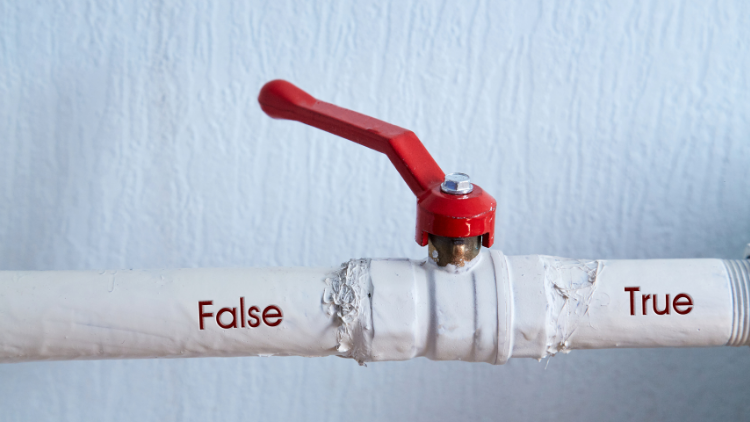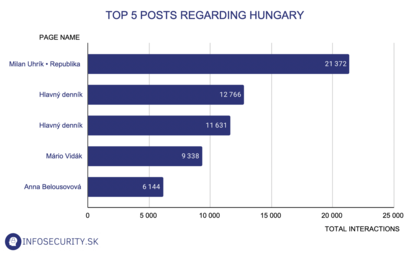DISINFORMATION
Distortion of historical facts helps pro-Kremlin propaganda during the 54th anniversary of Soviet occupation in Slovakia

Infosecurity.sk presents an overview of disinformation trends that have been on the rise in information space in the past two weeks:
- The 54th anniversary of the Soviet invasion of Czechoslovakia was accompanied by distortions of history, disinformation, and half-truths.
- Some disinformation actors are trying to blame the Soviet occupation on Ukrainians to influence Slovakia's public opinion in favour of Russia.
- Economic problems such as high energy, fuel, and food prices are also a hot topic in Slovakia. Pro-Kremlin actors justify Russian aggression in Ukraine and blame the West solely for its economic problems.
- Disinformers are trying to undermine the confidence of Slovaks in their allies and conspire about a deliberate intention by the US to weaken the EU and make money out of it.
- Pro-Russian actors praise the Hungarian government and highlight their restrained approach to the war in Ukraine and their anti-EU sentiment.
Distorting history to further pro-Russian propaganda
On 21 August, Slovakia and the Czech Republic commemorated the 54th anniversary of the invasion of Czechoslovakia by Warsaw Pact troops. On that black day, the occupation of Czechoslovakia began and lasted for the next 23 years.
In 2022, however, we are facing distortion of historical facts, spreading of disinformation and half-truths by which pro-Kremlin propaganda is trying to influence public opinion in Slovakia. Attempts to change Slovak history have intensified in the context of the war in Ukraine, and various actors are also seeking to influence Slovak society in this way.
The Slovak Police is responding to this situation and, in cooperation with the Nation's Memory Institute, has prepared an information campaign to educate society and identify and debunk false narratives currently prevailing.
For example, there are claims that the occupation was fraternal assistance that helped Czechoslovakia and defended it from the evil influences of the West. Fraternal assistance is a common phrase in Communist propaganda, which propagandists use to avoid terms such as invasion or occupation.
The narrative that Ukrainians were responsible for the Soviet occupation of Czechoslovakia became prevalent. Disinformers refer to the fact that Brezhnev was a Ukrainian, the Politburo was dominated by Ukrainians, or there was only one Russian in the Politburo, and he voted against the occupation. Attributing the occupation to one ethnic group, however, is not plausible. As historian Peter Jašek of the Nation's Memory Institute explains, the invasion of Czechoslovakia was a military action directed by the Soviet Union. The decision was taken by the Soviet Politburo as a collective body and cannot be identified with any particular Soviet republic.
Claiming that Brezhnev was a Ukrainian is not convincing either. Although born to Russian parents in Ukraine, Brezhnev claims Russian nationality in his memoirs. The suggestion that Ukrainians dominated the Politburo is also incorrect. Not counting Brezhnev, five members claimed Russian nationality, three Ukrainian, one Belarusian, and one Latvian. The decision for the occupation of Czechoslovakia was voted for by all the members and was therefore taken unanimously.
A considerable number of pro-Kremlin propagandists, in connection with the Soviet occupation of Czechoslovakia, talk about the alleged American occupation of Slovakia in the present. When they talk about the American occupation of Slovakia, they usually refer to the US-Slovak defense cooperation agreement (DSA) or to the allied troops present in Slovakia as part of NATO's Multinational Battlegroup. Some refer to the treaty with the US as a treaty of occupation, while others see no difference between the Soviet occupation in 1968 and the alleged occupation by NATO troops in 2022.
On the 54th anniversary of the Soviet invasion of Czechoslovakia, parallels with the current war in Ukraine were also noted. For example, Slovak police pointed to Soviet propaganda that spoke of fascism coming to Czechoslovakia from the West and several other similarities.
Ľuboš Blaha, chief ideologist of the Smer-SD party who has long sympathized with the Russian regime, disagrees with the comparisons to the ongoing situation in Ukraine. In a video addressed to President Zuzana Čaputová, he asks: "Where does Čaputová see parallels? Is she crazy?!" Blaha implies that the invasion of Czechoslovakia was the responsibility of the Ukrainians while also justifying Russia's aggression in Ukraine claiming that the Banderites were killing Russians in the Donbas. On the one hand, he puts Alexander Dubček, who was a "humanist and a good man," and on the other hand, he puts the "bloodthirsty Banderites."
When Blaha talks about the Banderites, he employs another myth about Ukraine, according to which the Ukrainians and especially the Ukrainian government are supporters of Stepan Bandera, a Ukrainian far-right leader who collaborated with Nazi Germany. Blaha also accused the Slovak president of spreading "Russophobic nonsense."
Who is to blame for the high prices?
High energy and fuel prices, as well as general increases in prices, are also a pressing issue in Slovakia at the moment. Although much of the economic problems we are currently experiencing are caused by the war in Ukraine and its side effects, disinformation actors are pushing their narratives. Those are largely based not on rational economic explanations but on misleading, disinformation, or conspiracy theories.
At the moment, when the energy supplies are uncertain, European countries are preparing for different scenarios and considering different measures that could be used to save energy. However, this is being exploited by various actors. In the video criticizing the European Union, former Prime Minister Robert Fico asks: "The botched anti-Russian sanctions, with disastrous consequences for those who came up with them, allow the citizens of the European Union to ask why, because of the war in Ukraine, they have to have a room that is 19 °C in the winter and why someone is telling them that they need to wear two jumpers."
Pro-Kremlin actors defend Russia and blame the West for its economic problems. The disinformation website InfoVojna published an article reporting on Prime Minister Eduard Heger's speech on the passing of six months since the beginning of the war in Ukraine. The article is titled: "Heger spreads lies, demagogy, and Ukrainian propaganda. According to him, Putin is responsible for all the problems in the world, for the war, for inflation, and for the rise in energy and food prices."
They blame the economic problems on Western governments, the European Union, but most often on the US. The Member States and the European Union are often characterized as incompetent and accused of servile policies that benefit American interests. The US, however, is the subject of conspiracies about a deliberate intention to enrich itself in the war in Ukraine.
MP Milan Mazurek, who in the past lost his mandate after being convicted of making racist remarks, published a post titled: "THE GOVERNMENT HAS BETRAYED US! AMERICAN COMPANIES ARE PROFITING MASSIVELY OFF THE POVERTY OF EUROPEANS!" In the post, he claims that the anti-Russian sanctions are primarily destroying the European population, that "the US is an ally that will squeeze the last cent out of a suffering friend and laugh at his stupidity," or that "Europe is led by an anti-European faction that, by telling us about its intention to defeat Putin, is securing for us a future full of poverty and hopelessness."
Ľuboš Blaha was critical, too. He criticized the anti-Russian sanctions by saying, "Europe is committing harakiri, and the Americans are laughing at us from across the ocean, and making money out of it." He also urges people to remember this when they see high food prices in the stores.
MEP Milan Uhrík commented in a similar tone on the euro's fall below the dollar: "The euro has already fallen below the dollar. Soon it will be worthless. Europe is going broke, America is making money. Pure economic treason."
Actors in Slovakia see Hungary as a model in its attitude towards the war in Ukraine
In recent weeks, we have also seen an increase in posts praising the Hungarian government. Pro-Russian actors see Viktor Orbán's government as a model for Slovakia. Hungary has long undermined the unity of European action against Russia as it has been more restrained in the initiatives to support Ukraine, has spoken out against sanctions on Russia, has defended imports of Russian gas and oil, and generally has a long-standing anti-EU sentiment.
Uncritical support for Hungary appears across a variety of actors, which is why we decided to look at it through the analytical tool CrowdTangle, which showed us the most popular Facebook posts on the topic among Slovak disinformation actors. The posts were evaluated based on the total number of interactions (the sum of all reactions, comments, and shares).

First place belongs to Milan Uhrík, MEP and head of the far-right Republic party. He congratulates Hungarian Prime Minister Orbán on negotiating more gas supplies from Russia while criticizing Western leaders for irresponsible amateurism. According to him, they are deliberately leading their countries into an economic crisis and preparing to freeze in the winter.
Until recently, Hlavný denník was blocked in Slovakia for malicious activities. However, it is now fully operational and once again spreading pro-Kremlin propaganda. In the first post, they highlight a speech by Hungarian President Katalin Novák, who said that Hungary would not be blackmailed by Europe. In the second post, they report on Viktor Orbán's statement that the war in Ukraine will lead to the end of Western dominance. He claims that the "actions of the ruling globalist class" in the West are leading to internal crises that threaten the future of these countries. In particular, he sees sanctions against Russia as self-defeating.
Mário Vidák shared an article from Magazín1, which he himself is behind and is affiliated with the Kotleba-ĽSNS party. The report is titled: "Hungarians will get extra gas from Russians. Their minister visited Moscow, they will get through the winter in peace."
In the last post, former nationalist MP Anna Belousovová says she envies Hungarians their president. She claims that Hungarian President Novák puts her nation and state first, even in difficult times. In contrast, according to Belousovová, Slovak President Čaputová saves others, albeit at the expense of her own nation's interests.
Project Infosecurity.sk organized by STRATPOL – Strategic Policy Institute and Slovak Security Policy Institute, which is supported by the Prague office of the Friedrich Naumann Foundation for Freedom, continuously monitors the activities of both Slovak and foreign disinformation actors, but focuses mainly on the former. The project activities are built upon daily monitoring of emerging disinformation, hoaxes, and conspiracy theories in the online information space. This approach allows the analysts to identify disinformation posts and narratives that resonated with the public the most, as well as to find out where they originated, and how they spread and evolved on social media. The report takes the form of a bi-weekly summary of arising trends in the spread of malicious information content online. Based on that, Infosecurity.sk can warn the public about emerging and current trends in the field of disinformation, manipulation, and propaganda.

